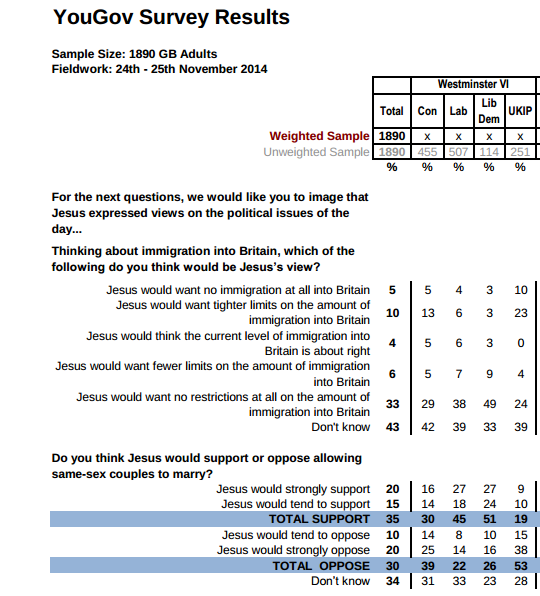Liam Fox: "a society that actually aborts 180,000 unborn children every year is a society that needs to be asking a lot of questions about itself. For me it's a simple personal belief. It says, "thou shall not kill", it doesn't say, thou shall not kill unless Parliament says it's OK. For the same reason I'm against the death penalty. However, I do accept...that if the majority of the population decide that it's something they find acceptable, I've got to live with that. But I'm not going to be quiet and I'm not going to pretend that my views are other than they are for the sake of political convenience."
Stephen Crabb: "There's something unattractive about politicians who wave a flag called faith, but at a personal level it's important for me. The Old Testament talks about 'widows and orphans' - shorthand for the poor and vulnerable.
"Not a bad guiding star for social policy. Jesus Christ oozed compassion."
elsewhere, wisely but sadly: Warning of a "creeping intolerance" towards Christianity and religion, the Conservative Cabinet minister said "hard-edged secularism" had created "an enormous chilling effect" in workplaces that prevented people talking openly about their beliefs.
"I have never found it easy as a politician to talk about my faith," he said. "In an age where every word is watched for something that can be construed as a gaffe, off-message or representing some bigoted or irrational attitude, it is a topic which many of us steer clear of.
"It kind of makes life simpler."
Teresa May: “You don’t think about it at the time, but there are certain responsibilities that come with being the vicar’s daughter,” Mrs May admits. “You’re supposed to behave in a particular way.” She was always tall and walked with stooped shoulders because she was self-conscious. She was quite a swot at school. “I shouldn’t say it, but I probably was Goody Two Shoes.”
She was brought up listening to Test matches on the wireless with her father. Her pin-up was – I kid you not – one Geoffrey Boycott. “I have been a Geoff Boycott fan all my life,” she admits, laughing. “It was just that he kind of solidly got on with what he was doing.” ....
The Mays have no children, one of those “ultra-intrusive subjects” on which she has been silent until now. “It just didn’t happen,” she says quietly. “This isn’t something I generally go into, but things just turned out as they did.” She admits to a sense of loss. “You look at families all the time and you see there is something there that you don’t have.” As a strong Christian, she believes in making the best of the hand you are dealt.
Tim Farron should call a prayer meeting. I'm serious.
Update: the danger of posting any politics story at the moment is that it can go out of date very quickly. Michael Gove "It's because I am a Conservative I believe in the rule of law as the foundation stone of our civilisation. It's because I'm a Conservative I believe that evil must be punished. But it's also because I'm a Conservative and a Christian that I believe in redemption. (source). The National Secular Society aren't going to know who to brief against first...
Update 2: Andrea Leadsom: "I always try to ensure that I'm doing what I think God would want me to... I try and keep in mind that God's there and guiding my hand and helping me...I try to keep my beliefs and my faith through the work I'm doing." from Christians in Parliament interview.
Update: the danger of posting any politics story at the moment is that it can go out of date very quickly. Michael Gove "It's because I am a Conservative I believe in the rule of law as the foundation stone of our civilisation. It's because I'm a Conservative I believe that evil must be punished. But it's also because I'm a Conservative and a Christian that I believe in redemption. (source). The National Secular Society aren't going to know who to brief against first...
Update 2: Andrea Leadsom: "I always try to ensure that I'm doing what I think God would want me to... I try and keep in mind that God's there and guiding my hand and helping me...I try to keep my beliefs and my faith through the work I'm doing." from Christians in Parliament interview.


